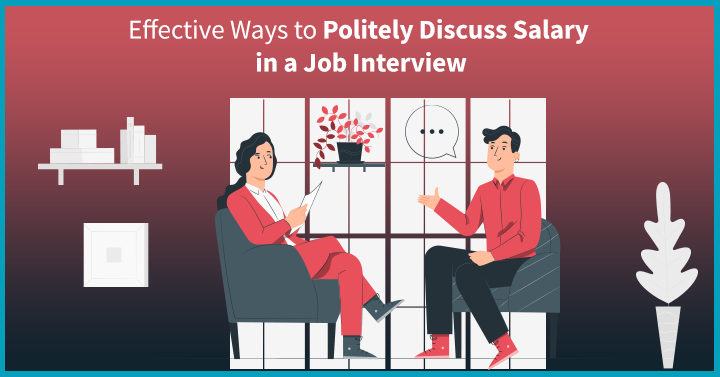It’s one of the most difficult aspects to navigate in any hiring process and can cause no end of anxiety: how to discuss salary in a job interview. It’s also, of course, one of the most important considerations when deciding whether to take a position, which is why it’s essential not to avoid raising the issue out of delicacy.
If you’re one of the many people worrying over how to ask for the salary politely, then dismiss those concerns from your mind because it’s not as daunting as it seems and can be easily negotiated with just a little preparation.
To read more articles on our interview preparing series, you can check them out below :-
Read our interview article on describing your work ethics here
Read our interview article on how to talk about yourself here
Read our interview article on how to follow up through an email here
Read our interview article on what makes you unique here
Read our interview article on why you are the best person for the job here
Read our interview article on what you can contribute to the company here
Read our interview article on crafting a winning resume using the STAR framework here
1. How to Prepare Before You Discuss Salary in an Interview
1.1 Do sufficient research
These days, there are numerous websites that can help give you an idea of the average salary in a particular industry and for a particular position. For instance, organizations like Glassdoor and Comparably were specifically created to help job seekers figure out their options, while job sites like Totaljobs and Reed also offer salary checkers..
1.2 Wait for suitable timing
Timing is one of the most important considerations around how to discuss salary in a job interview. You don’t want to give a potential employer the impression you’re only in it for the money, which is why you shouldn’t bring up moolah straight away. Instead, wait until the end of a first interview or even hold off until a second interview to discuss remuneration. Once you’ve already sold your skills to the hiring person and impressed them with your qualifications, that’s the moment to address income.
1.3 Ask for more details
What else is included alongside the salary? Are there health benefits? What are the paid holiday terms? Does the company offer flexible hours? You’ll want to weigh up the core income against other desirable employee benefits before making a decision. If the corollaries are attractive, the core pay may not need to be as high. For instance, if a company offers to reimburse you for your daily transport to and from work, that may actually end up saving you a lot of money, and therefore it may be reasonable to accept a lower salary.
1.4 Don’t volunteer a salary figure or range
How do you negotiate a salary offer? Ideally, you should be asking your potential employer what they’re offering and not the other way around. This will give you an idea what their starting point is and hand you a bit more leverage. Avoid being the one to suggest an amount of remuneration if you possibly can.
1.5 Think beyond the paycheck
Income may not be the only consideration when it comes to accepting an offer. In addition to the employee benefits mentioned above, if the role is highly desirable for your career progression or the office is based in a convenient location from your home, you may consider taking lower pay.
1.6 Give a salary range
There are certain situations where you might not be able to avoid being the first one to discuss salary figures, such as if it’s asked up front in a job posting or the interviewer beats you to the punch. If that is the case, you should offer a range, rather than a specific figure, so you have some wiggle room. Make sure the lower end is still something you’d accept, while the higher end can be more optimistic than realistic.
1.7 Don’t assume you have to accept the first offer
Don’t feel hamstrung by politeness – it’s perfectly acceptable to negotiate in a professional manner. In fact, it can increase your value in the eyes of a hiring person if they think you are confident in your worth and are aware of what the market rate is for the position.
2. How to Discuss Salary in a Job Interview
2.1 Get your figures right
Should you tell the recruiter your salary expectations? As mentioned above, it’s better to have an employer suggest some figures first if you can help it. However, if you do give an income range, make sure you’ve done your research and have a fair idea of what’s normal for the role you’re applying to. You don’t want to price yourself out or sell yourself short.
2.2 Discuss what's offered
As a result of the pandemic, one survey found that 36% of hiring managers are more likely to negotiate salaries with new hires. Once you’ve broached the subject of a job offer, don’t forget to dig into additional benefits and bonuses that may be on offer.
2.3 Present a strong case
Part of the reason to leave the salary discussion towards the end of an interview is because by that point you should already have demonstrated how you can add value to a company. This gives you a solid basis from which to negotiate your starting income.
2.4 Never mislead a prospective employer
This really should go without saying, but don’t tell untruths about your previous compensation or other job offers you are considering. Getting the salary you desire should not come at the cost of being unethical.
2.5 Get it in writing
Finally, make sure you have a written record of a job offer, including the salary and any promised benefits, before you notify your current employer that you’re leaving. The last thing you want is to be premature with departing from gainful employment, only to find that the deal hasn’t actually been confirmed.
3. How to Ask about Salary in an Email after Interview - Sample Answers

3.1 How to discuss salary in a job interview
Towards the tail end of a job interview is the best time to bring up a discussion of salary in person. Remember to be polite but confident. After all, it’s a perfectly reasonable inquiry and an important consideration.
“I’ve really enjoyed learning more about this role. May I ask how the compensation package compares with similar positions at other organizations?”
3.2 How to ask about salary in an email after interview
Perhaps you didn’t feel the timing was right during the interview or you just forgot to get around to inquiring. If that’s the case, you can also consider how to ask about salary after an interview. This can be included as part of a follow-up email.
“Dear [Insert Hiring Person’s Name],
Thank you for taking the time to meet with me to discuss the position of [Insert Job Title]. It was a real pleasure getting to know you and to learn more about this exciting opportunity.
I’m glad we got the chance to talk in greater detail about how my experience with various programming languages would fit with the company’s objective to launch a suite of new software products. As I mentioned, I’ve worked in developing new products for launch for the past decade and would certainly be able to bring a wealth of insight to [Insert Company Name].
I realize we didn’t get a chance to discuss the salary during our meeting. I would appreciate it if you could give me a steer on what the remuneration is for the role, as well as any benefits that are associated with the position.
If you have any further questions for me that we didn’t get to go over during the interview, I’d be happy to discuss them with you at your earliest convenience.
Yours sincerely,
[Insert Your Name]
3.3 How to discuss salary with HR
Some companies prefer to leave salary discussions to the HR department, rather than involving a potential boss or line manager. In these cases, it’s OK to be a little bit more direct.
“I’m ideally looking for a salary in the range of £50,000 to £60,000. Could you tell me whether that’s in line with the budgetary expectations of this role at your company?”
4. FAQs
- How to ask about benefits and work-life balance?
Alongside how to discuss salary in a job interview, you will also want to get an idea of the benefits, such as health insurance or cycle to work schemes, that are on offer at a company. Remember that the pay isn’t everything, and it may be worth taking a lower salary if a company seems to offer an enviable work-life balance, whether through remote working or flexible hours.
- How to answer salary expectations for an entry-level job?
Entry-level jobs generally come with entry-level salaries. This will vary from position to position – for instance, an entry-level data scientist will earn more than an entry-level customer services representative – but bear in mind that if you are changing career paths, you will likely experience a steep pay cut.
 Interested in Virtual Team Building Events?
Interested in Virtual Team Building Events?





















